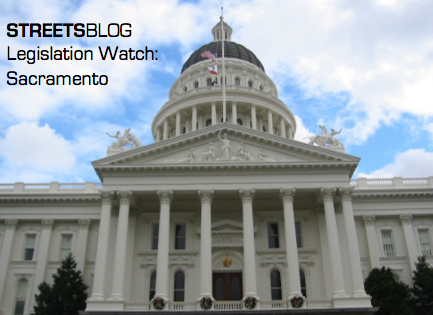California's legislative season is heating up, and both the Assembly and the Senate are beginning to read and discuss the bills wending their way though the session. Here's Streetsblog's weekly highlight of events and legislation related to transportation at the capitol.
A.B. 1532, Mike Gatto's (D-Los Angeles) hit-and-run legislation, passed its second approval at the Assembly Transportation Committee. The law would suspend the license of any driver found guilty in a hit-and-run crash, even if the crash is labeled a "misdemeanor" and the injuries are minor. From here, the bill moves to the Committee on Appropriations, then to the Assembly Floor for a full vote. You can read more about A.B. 1532 here and here.
S.B. 1183, from Mark DeSaulnier (D-Concord), was amended to change its name from “Bicycle Tax” to “Local Bike Infrastructure Enhancement Act of 2014," in an attempt to focus attention on the trails it is meant to support and away from the fact that it is a proposed tax. It is, however, still a tax on bicycles. It's set to be heard in the Senate Transportation Committee on April 9. Expect to hear more about this one, and catch up on our introduction to the bill here.
A.B. 2013, from Al Muratsuchi (D-Torrance), would increase the available number of stickers that allow zero- and low-emission vehicles to use carpool lanes and to ride free in many toll facilities throughout the state. The stickers are seen as a major incentive for people to switch to cleaner vehicles but could have unintended consequences of filling up high-occupancy vehicle lanes in areas experimenting with congestion pricing. The bill unanimously passed the Transportation Committee and now moves to Appropriations.
A.B. 1501, from Jim Patterson (R-Fresno), would have prohibited the use of federal funds to build high-speed rail unless matching state funds were readily available. It was voted down in the Transportation Committee along party lines: Democrats 11, Republicans 4.
A.B. 1566, from Chris Holden (D-Pasadena), would increase penalties for stealing inedible kitchen grease, “a seemingly useless and admittedly gross substance,” according to the bill's author, but one that is nevertheless growing in value as well as attraction to thieves for increasing use as biofuel. This passed the Transportation Committee and moves to the Agriculture Committee.






